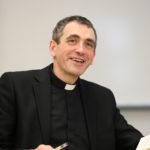Through key philosophical and theological texts, this seminar seeks to ponder in what sense the perception of being as gift is able to retrieve and deepen an adequate account of causality. This reflection is also at the service of the clarification of what it means to give of oneself. The contemporary conception of causality as extrinsic imposition of (normally topographic) movement by means of force has silenced the classic conception of causality as the communication of esse as act (Aquinas, De principiis naturae). It has also established anarchy, lack of principle, as a fundamental contemporary axiom. Since one of the main reasons for this radical shift was the corresponding change in the perception of the transcendental good—from perceiving the good in terms of generosity to those of power (dominance, ruling, and ordering)—it is crucial to elucidate in what sense perceiving the communication of esse in light of gift, thus retrieving generosity, may yield an adequate understanding of causality. Pondering the meaning of causality, therefore, is a twofold task. First, it necessitates a philosophical reflection on the specificity and interconnectedness of the fourfold causality. Second, it requires a theological reflection on the divine communication of esse—that is, to ask what it means for God to give in and to Himself and to give in such a radical way that it allows the concrete singular both the possibility of being and the capacity to give. The seminar approaches the speculative issue of causality from a historical perspective. The seminar is divided into three parts. The first revisits the Greek understanding of causality and the good (Plato, Aristotle, Plotinus). The second examines the understanding of causality within the framework of the Triune God (Dionysius, Aquinas, Ockham). The third approaches the modern shift that reads causality in terms of power (Hume, Hegel, Heidegger).
Selected Texts
Thomas Aquinas, Commentary on the Book of Causes.
Thomas Aquinas, De potentia Dei.
Thomas Aquinas, De principiis naturae.
Hannah Arendt, The Human Condition.
Aristotle, Metaphysics.
Jonathan Barnes (ed.), The Complete Works of Aristotle.
Compendium of the Social Doctrine of the Church.
Romano Guardini, “Power and Responsibility: A Course of Action for the New Age,” In The End of the Modern World.
G. W. F. Hegel, Science of Logic.
Martin Heidegger, The End of Philosophy.
David Hume, A Treatise of Human Nature.
John Paul II, Laborem exercens.
Friedrich Nietzsche, Beyond Good and Evil: Prelude to a Philosophy of the Future.
Friedrich Nietzsche, The Portable Nietzsche.
William of Ockham, Philosophical Writings.
William of Ockham, Quodlibetal Questions, vols. 1 and 2.
Plato, Complete Works.
Plotinus, Enneads.
Pseudo-Dionysius, The Divine Names. The Mystical Theology.
Joe Sachs, Aristotle’s Physics: A Guided Study.
Friedrich W. J. Schelling, The Ages of the World.
Faculty

Antonio López, F.S.C.B.
Vice President
Provost
Professor of Systematic Theology
Rev. López teaches and writes in the areas of trinitarian theology, metaphysics, theological anthropology, and marriage. He serves as editor of Humanum Academic Press and of the English Critical Edition of the Works of Karol Wojtyła and John Paul II, a continuing series from CUA Press.
Learn More